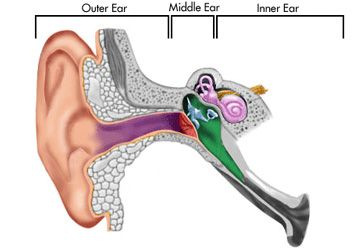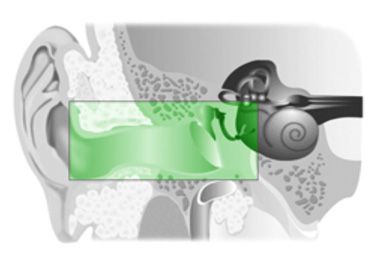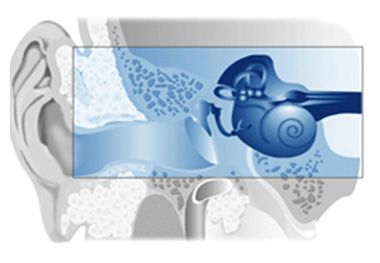Hearing Loss
Common Signs of Hearing Loss
You might have hearing loss if you…
In Social Situations
- Require frequent repetition.
- Have difficulty following conversations involving more than 2 people.
- Think that other people sound like they are mumbling.
- Have trouble hearing children and women.
- Have your TV or radio turned up to a high volume.
- Answer or respond inappropriately in conversations.
- Have ringing in your ears.
- Read lips or more intently watch people’s faces when they speak with you.
Emotionally
- Feel stress from straining to hear what others are saying.
- Feel annoyed or frustrated at other people because you can’t hear or understand them.
- Feel embarrassed to meet new people or from misunderstanding what others are saying.
- Feel nervous about trying to hear and understand.
- Withdraw from social situations that you once enjoyed because of difficulty hearing.
Medically
- Have a family history of hearing loss.
- Take medications that can harm the hearing system (ototoxic drugs).
- Have diabetes, heart, circulatory or thyroid problems.
- Have been exposed to very loud sounds over a long period or single exposure to explosive noise.
Consequences of Hearing Loss
Many people are aware that their hearing has deteriorated but are reluctant to seek help. Perhaps they don’t want to acknowledge the problem, are embarrassed by what they see as a weakness, or believe that they can “get by” without using a hearing aid. And, unfortunately, too many wait years, even decades, before getting treatment.
Research demonstrates the considerable negative social, psychological, cognitive and health effects of untreated hearing loss…with far-reaching implications that go well beyond hearing alone. In fact, those who have difficulty hearing can experience such distorted and incomplete communication that it seriously impacts their professional and personal lives, at times leading to isolation and withdrawal.
Studies have linked untreated hearing loss to:
- Irritability, negativism and anger
- Fatigue, tension, stress and depression
- Avoidance or withdrawal from social situations
- Social rejection and loneliness
- Reduced alertness and increased risk to personal safety
- Impaired memory and ability to learn new tasks
- Reduced job performance and earning potential
- Diminished psychological and overall health
Hearing Loss Statistics
- Hearing Loss Affects 1 in 10 people in the U.S.
- Hearing loss affects 1 out of every 3 people age 60 and older.
- 1 in 6 baby boomers (ages 41-59), or 14.6%, have a hearing problem.
- 1 in 12 30-year-old Americans is already hearing impaired.
- At least 1.4 million children (18 or younger) have hearing problems.
- It is estimated that 3 in 1,000 infants are born with serious to profound hearing loss.
- The percentage of Americans that will suffer from hearing loss is increasing every year.

How We Hear
- Outer ear catches sound waves and directs them into the ear canal.
- Ear canal carries the sound waves to the eardrum (tympanic membrane)
- Sound waves cause the eardrum (tympanic membrane) to vibrate.
- Three small bones in the middle ear pick up these vibrations.
- Vibrations pass through the oval window to the cochlea setting the fluid inside in motion. This causes special nerve cells to turn the sound waves into electrical impulses.
- Auditory nerve sends these electrical impulses to the brain where they are heard as sound.
Types of Hearing Loss
Conductive Hearing Loss

Sensori-neural Hearing Loss

Inner ear cannot send sound correctly to the brain. Sensori-neural hearing loss is treated with:
- hearing aids
- assistive devices
- cochlear implant
- hearing protection
Mixed Hearing Loss

Combination of both conductive and sensori-neural loss. A Mixed hearing loss may be treated medically and with hearing aids.
Common Myths about Hearing Loss and Hearing Aids
-
“My type of hearing loss cannot be helped”Fact…..Over 95% of people with hearing loss can successfully wear Hearing Aids.
-
“I’m too old to benefit from hearing aids”Fact…Hearing is a critical part of the quality of life for people of all ages.
-
“I would be the first to know if I had a hearing loss.”Fact…It is typical for individuals with mild or moderate hearing loss to be unaware of their hearing problem.
-
“Hearing Aids are too expensive.”Fact…The cost of new digital technology is much more affordable than most people realize.
-
“Hearing aids are big, bulky and uncomfortable”Fact…Modern digital technology allows for much smaller and more comfortable styles of hearing aids…some are not visible at all.
-
“Hearing aids just make everything too loud.”Fact…Modern digital hearing aids use tiny computers that only increase the volume of frequencies that the wearer’s prescription requires.
-
“Hearing aids make embarrassing squealing noises.”Fact…Digital Hearing aids now have advanced feedback controls that stop the whistling noises often associated with older hearing aids.
-
“I don’t need a hearing aid until I can’t hear anything.”Fact…Wearing hearing aids at the early stages of hearing loss will help to slow the effects of hearing loss.
What can you do to protect your Hearing?
- If you work in an at-risk occupation, check with your employer to make sure you have adequately protected your hearing according to OSHA regulations.
- Limit exposure time to noisy activities.
- Wear hearing protection, such as foam or silicone plugs or muffs. Foam plugs are available at your pharmacy while muffs and specialized ear protection can be purchased at sporting good stores or safety equipment stores.
- At home, turn down the volume on the television, radio, stereos and walkmans.
- Wear ear plugs or muffs when using loud equipment (i.e. lawn mowers, power saw, leaf blower).
- Buy quieter products (compare dB ratings – the smaller the better).
- Reduce the number of noisy appliances running at the same time in your personal environment.
- Avoid medications that can be dangerous to your hearing. Be sure to ask your physician about possible effects on your hearing.
Hearing Loss and Children
Children’s quality of life and development vitally depend on the ability to hear. Children learn to speak because they hear others and themselves communicate. The ability to hear and understand helps your child learn to read, appreciate music, and receive warnings of approaching dangers. Your child will have difficulty coping with many of life’s challenges and opportunities at home and in school without good hearing. The single most important sign of hearing loss in children is the failure to develop, or the delayed development of spoken language.
If children have severe or profound hearing loss, it is usually obvious that they do not respond to sound. Sometimes it is difficult to detect mild forms of hearing loss, including hearing loss in only one ear. Even the more common forms of mild hearing loss, however, can negatively impact communication development and school performance.
Common warning signs for hearing loss in Children include:
- Hearing acuity
- Delays or differences in speech and language development
- Attention or behavioral difficulties
- Academic performance
- Use of “what?” or “huh?” frequently
- Intently watching the faces of speakers
- Difficulty understanding speech in background noise
- Sitting close to the TV set when the volume is adequate for others; increasing the TV or stereo/tape/CD player volume to unreasonably loud levels
- Not responding to voices over the telephone or switching ears continually when the phone is utilized
- Not startled by intense sounds
- Unable to locate the source of a sound accurately
Child Communication Development Guide
-
Age
Communication Behavior
-
5 monthsTurn to source of moderate & soft sounds
-
6 monthsRecognize familiar voices & engage in vocal play with parents
-
9 monthsDemonstrate understanding of simple words
-
10 monthsBabbles by stringing multiple, single-syllable speech sounds together
-
12 monthsOne or more real, recognizable spoken words emerge
-
18 monthsUnderstands simple phrases, retrieves, places or manipulates familiar objects on spoken request; points to body parts on request. Spoken vocabulary of 20-50 words and short phrases
-
24 monthsSpoken vocabulary 200-300 words; speaks in simple sentences; most speech is understandable to adults not with the toddler on a daily basis; sits and listens to read-aloud story books
-
3-5 yearsUses spoken language constantly to express wants, reflect emotions, convey information and ask questions. The child understands nearly all that is said. Vocabulary grows rapidly: 1000-2000 words; produces complex and meaningful sentences. All speech sounds are clear and understandable by 5 years.
Tinnitus. The noise in your head that won’t go away.
“My ears whistle and buzz continually day and night. I can say I am living a wretched life”.
-
Definition of TinnitusTinnitus is a sound that seems to originate from the head or ears. It may be described as “ringing, buzzing, hissing, crickets, or roaring”. Tinnitus is not a disease. Tinnitus is a symptom of something wrong in the auditory system.
-
Tinnitus Facts
- 17% of the world’s population has tinnitus.
- 44% of the US population is affected by tinnitus totaling more than 50 million Americans.
- Tinnitus is the #1 service-connected disability for US veterans.
- Over 744,000 veterans received disability compensation for tinnitus at the end of 2010.
- An amazing 94% of patients seeking care for tinnitus are not offered treatment.
-
Causes of Tinnitus
Exposure to loud noise is the most common cause of preventable tinnitus. 90% of all people with tinnitus have some degree of noise-induced hearing loss. The truth is that almost any problem with the ears or auditory system can cause tinnitus
-
Understanding Tinnitus
Tinnitus is associated with a variety of problems such as sleep difficulties, fatigue, stress, trouble relaxing, difficulty concentrating, depression and irritability. It can have an effect on quality of life including social interactions and work.
When we hear, sound passes through the outer and middle ear to the inner ear. The inner ear converts the sound to electrical impulses and sends them to the brain. The brain doesn’t receive the sound it expects due to a problem in the auditory system. The brain turns up the sensitivity, or volume control, and becomes sensitive to other electrical activity in the brain. The brain then perceives the new electrical activity as sound – or tinnitus. Although tinnitus may be caused by a problem in the ear or auditory system, tinnitus comes from the brain.
-
Objective Tinnitus
An actual sound can be heard emanating from the patient’s ear. This may be caused by muscle spasms causing “clicks” or “crackling” in the ear. Occasionally, this beats in time with one’s pulse. Pulsatile tinnitus may be a symptom of a serious medical condition.
-
Subjective tinnitus – most common type
Usually results from the same conditions that cause hearing loss. Conditions such as noise exposure, natural aging process, ear infections, and medications all may contribute and subjective tinnitus may occur with or without the presence of hearing loss.
-
Tinnitus Solutions
There is no cure for tinnitus. However, “no cure” doesn’t mean “no help”! Because tinnitus can be a symptom of a more serious disorder, it is important to have an appropriate health evaluation with an Ear, Nose and Throat Specialist.
-
Counseling
Counseling can be beneficial to many patients by improving emotional stability, concentration and sleep.
-
Hearing aids
Often, just wearing appropriately fitted hearing aids will relieve tinnitus. Sometimes, hearing aids alone, don’t offer the help patients need. Hearing aids with special features designed for tinnitus are now available. Some products are designed to mask the tinnitus with a soft “Shhhh” sound or “wind-like” noise. The sound is adjusted to match the tinnitus for each patient. Other products produce soft “music-like” tones, called fractal tones, to make the tinnitus less noticeable. The fractal tones are adjusted based on hearing sensitivity. Research has shown that listening to fractal tones can reduce the perception of tinnitus, improve concentration, and provides relaxation.
The good news is that with the latest advancements in technology available, most people get relief from some form of tinnitus treatment! Not all strategies are effective for everyone. If you suffer from tinnitus, consult with our hearing professionals and Dr. Richards. Take action to improve your quality of life and get help for “the noise in your head that won’t go away.”